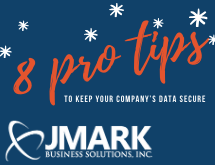Top Tips 2020 – 8 Pro Tips to Keep Your Company’s Data Secure
Article provided by Todd Nielsen
It’s a nightmare scenario for any business: hackers have accessed your valuable information, and now your personal and financial records are compromised. Data breaches are one of the most significant threats facing small- to medium-sized businesses. According to the New York Times, 60% of reported hacks targeted small businesses, and most data breaches are not discovered until weeks after the fact.
With so much at stake, it makes sense to be as prepared as possible against looming cyberthreats. Here are eight tips you can use to keep your information safe:
- Create a Data Security Plan
The first step toward making sure your business is protected is to create a data security policy and communicate it clearly to all employees. This should include a list of authorized devices and software, protocols on how to recognize suspicious emails and avoid downloading files from unknown sources, and instructions about how to report threats. If your company does not have a dedicated I.T. department, it can be difficult to know where to begin when it comes to data security. A managed service provider (MSP) specializing in cybersecurity can help you draft a comprehensive plan that will keep your business protected.
- Train Employees
Security awareness training can drastically improve outcomes for businesses and their employees who would otherwise be vulnerable to cyberattacks. With a few preventive measures, you can detect threats like spear-phishing, ransomware, and malware before they corrupt your system. Training your employees to look out for suspicious downloads and only open emails from trusted senders will drastically reduce your likelihood of being vulnerable to hackers. An MSP can give employees the tools and training they need to recognize and report threats before they compromise your business.
- Assess Your Risks
Your company might have vulnerabilities you would never have considered. From uninstalled software patches to a lack of secure servers, risks to your I.T. security abound, and many companies don’t find out about them until it’s too late. If you are concerned about protecting your data, a managed service provider can do a risk assessment and give you recommendations about how to improve your security. A detailed report about the unique security challenges your business faces will help you to plan effective countermeasures.
- Control Access to Devices & Data
It might seem obvious that securing hardware is just as important as staying current with the latest cybersecurity best practices. However, companies often place so much emphasis on network security that they ignore the very real threat of phones or laptops being lost or stolen. Requiring logins at computer terminals is one effective way of controlling device access. Additionally, you can equip mobile devices with remote lock and data wipe capabilities. In addition to protecting devices, the FCC recommends limiting access to sensitive information to only the necessary employees; you should also limit the authority to install software on company workstations.
- Monitor Your Network Usage
Most small- to medium-sized businesses that experience network downtime or a data breach do not become aware of it until well after the fact. This puts valuable data at risk. Many companies struggle with outdated network equipment or lack the resources to invest in network monitoring that would alert them of potential outages and risks to data. By partnering with the right MSP, your small business can get guaranteed network uptime as well as monitoring capability that will help you optimize network usage in the future.
- Make Sure Software Is Updated
A lack of updated software caused the massive 2017 Equifax data breach. Hackers exploited a known vulnerability that would have been fixed by a patch in the most recent update, but it was not installed—and as a result, over 140 million people were compromised. This illustrates the vital importance of staying current with software updates and making sure you have a secure MSP watching and remediating your patches. You should also be using the latest version of any browser plugins like Flash, Java, etc., and make sure to keep your antivirus software up to date.
- Use a VPN
With a virtual private network (VPN), members of your company can exchange information between various devices, knowing that it is securely encrypted. VPNs allow only authenticated users to access information shared via the network, which is especially important for financial transactions and other exchanges involving personal information. Setting up a VPN is simple and inexpensive, and it can potentially save your business from a costly data breach.
- Create a Disaster Recovery Plan
Even with preventive measures in place, security breaches can and do happen every day. The smaller your business is, the more it stands to lose from being targeted by hackers. Creating a disaster recovery and business continuity plan is an essential step in securing your company’s future. Essential parts of the plan include: identifying acceptable thresholds for downtime and data loss, creating a communication plan, designating team member responsibilities, establishing a backup worksite, and testing the plan regularly. This is a major undertaking for any SMB, especially one without a dedicated I.T. department. Fortunately, an MSP can help you create a plan that keeps your business’s needs in mind.
If you are not sure how to start upgrading your I.T. solutions for better security, you might be putting off necessary changes that can safeguard your data. For more information about how managed services can help reduce your business’s exposure to cybersecurity threats, give me a call at 417-837-4875, email me at todd@JMARK.com, or check us out at JMARK.com.

